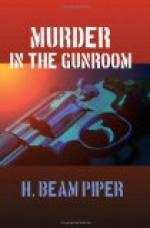“Uh-huh. Got the addresses?”
Rand furnished them, and Ritter noted them down. The waitress wandered back to see if they wanted anything else; she gave a small squeak of surprise when she saw the two big six-shooters on the table. Rand and Ritter repeated their orders, and when she brought back the drinks, the Colt and the Leech & Rigdon were out of sight.
“The way I see it, everybody who’s within a light-year of this Rivers killing is trying to pin the medal on somebody else,” Ritter was saying. “The Lawrence girl was afraid young Jarrett had done it; right away, she sicced you onto Gillis. Gillis didn’t lose any time putting McKenna and Farnsworth onto Gresham. Gresham’s the only one who didn’t have a pasty ready; you’re supposed to dig one up for him. And Jarrett, the first chance he gets, introduces Umholtz.” He stared into his beer, as though he thought Ultimate Verity might be lurking somewhere under the suds. “Do you think it might be possible that Rivers bumped Fleming off, in spite of his getting killed later?” he asked.
“Anything’s possible,” Rand replied, “except where some structural contradiction is involved, like scoring thirteen with one throw of a pair of dice. Yes, he could have. The way the Flemings leave their garage open as long as any of the cars are out, anybody could have sneaked into the house from the garage, and gone up from the library to the gunroom. The only question in my mind is whether Rivers would have known about that. That lawsuit and criminal action that Fleming was going to start—and that’s been verified from sources independent of Goode—was a good sound motive. And say he took the Leech & Rigdon away, after leaving the Colt in Fleming’s hand; selling it to some collector who’d put it in with a hundred or so other pistols would be a good way of disposing of it. And I can understand his trying to buy the Colt, to get it out of circulation.” Rand sipped his Bourbon. “But that leaves us with the question of who killed Rivers, and why.”
“Well, because Fleming is dead—and it doesn’t matter whether he was murdered or died of old age—Walters starts robbing the collection. He sells the pistols to Rivers,” Ritter reconstructed. “And, as Rivers doesn’t want them around his shop till they’ve had time to cool off, he stores them with this Umholtz character, who seems to have been in plenty of crooked deals with Rivers in the past. The pistols are worth about ten grand, and nobody knows where they are but Rivers and Umholtz, and if Rivers drops dead all of a sudden, nobody will know where they are except Umholtz, and in a couple of years he can get them sold off and have the money all to himself.”
“Yes, Dave; that’s good sound murder, too. And Rivers would sit down and drink with Umholtz, and Umholtz could take that Mauser out of the rack right in front of Rivers and Rivers wouldn’t suspect a thing till it was too late. Of course, it depends upon two unverified assumptions: One, that the pistols were sold to Rivers, and, two, that Rivers stored them with Umholtz.”




